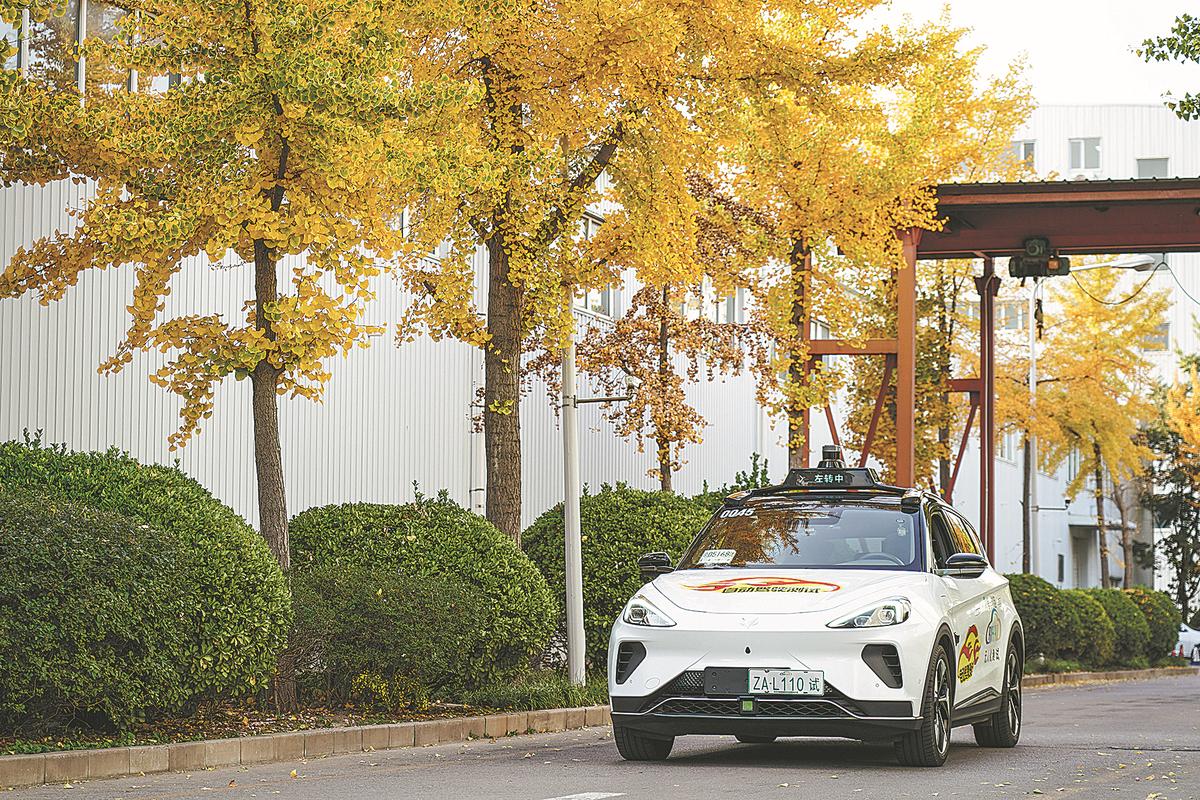
 0 Comment(s)
0 Comment(s) Print
Print E-mail China Daily, February 27, 2024
E-mail China Daily, February 27, 2024

An autonomous driving vehicle conducts a test run in Beijing. [Photo/Xinhua]
Beijing has granted permits to several robotaxi operators, including Baidu Inc and Pony.ai, allowing them to offer driverless vehicle services at Beijing Daxing International Airport, a key step indicating that the city has become the world's first capital to run autonomous passenger vehicles between urban areas and the airport.
Industry experts said the move marks a milestone in China's efforts to develop an intelligent transportation system, and will further bolster the commercial application of self-driving technology.
The approval, granted by the head office of Beijing High-Level Automated Driving Demonstration Area, allows these companies to provide self-driving vehicle services on 40-kilometer expressways connecting the international airport with Yizhuang in Beijing's Daxing district, as well as in some designated areas within the airport.
The permits come with the precondition that a safety inspector will sit behind the steering wheel and take manual control in case of an emergency.
The Beijing municipal government has unveiled plans to expand the scope of demonstration zones for high-level autonomous driving this year and promote the orderly launch of self-driving services in key areas such as airports, railway stations and urban roads.
"The approval is of great significance in further accelerating the commercialization of autonomous driving technology across the nation," said Zhang Xiang, a researcher at the Jiangxi New Energy Technology Institute, adding that other first-tier cities are likely to follow Beijing and allow the commercial operation of driverless vehicles at their airports in the future.
Zhang also called for more efforts to strengthen the construction of intelligent transportation infrastructure, such as 5G-enabled vehicle-to-everything, or V2X system, which supports communication between a vehicle and any entity that may affect or may be affected by the vehicle, in order to improve traffic efficiency and minimize accident risks.
Chen Zhuo, general manager of Baidu's self-driving business unit, said the company is concentrating on expanding its commercial robotaxi fleet.
Chen said Baidu's fully autonomous vehicles are currently operating in several cities including Beijing, Chongqing, Wuhan in Hubei province and Shenzhen in Guangdong province. The company plans to expand its fleet size and operation area, and build the world's largest fully driverless ride-hailing zone, he added.
Baidu's Apollo Go service has accumulated more than 4.1 million ride orders as of Sept 30. In the third quarter of last year, Apollo Go provided 821,000 rides, up 73 percent year-on-year. It has obtained more than 5,000 autonomous driving patents, with the total testing mileage of its self-driving vehicles exceeding 90 million kilometers.
A report released by global consultancy IHS Markit said the market size of China's self-driving taxi services is expected to surpass 1.3 trillion yuan ($180.6 billion) by 2030, accounting for 60 percent of the ride-hailing market nationwide.
China has introduced a series of policies to promote the development and commercialization of self-driving technology in recent years.
According to the Ministry of Industry and Information Technology, the country supports the commercial application of Level 3 and above autonomous driving systems. Level 3, or L3, means conditional automation, which allows a vehicle to drive by itself without human override under certain conditions.
Lyu Jinghong, an analyst of intelligent mobility at research company BloombergNEF, said the permits to operate robotaxi services between Daxing international airport and Yizhuang will further boost the testing and application scenarios of self-driving cars, especially on routes between transportation hubs and urban roads.
According to BloombergNEF's Electric Vehicle Outlook, China will operate the world's largest robotaxi fleet with about 12 million self-driving vehicles by 2040, followed by the United States with around 7 million such vehicles.